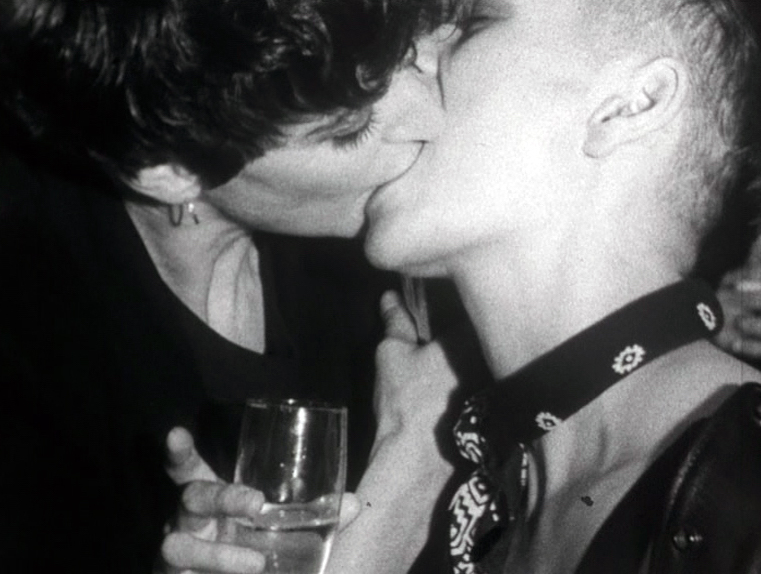Wednesday 14th March, 6.30pm at This event is free but booking is required. Book Here
During the 1980s, St Martins became an important site for the development of the relationship between Feminism and artists moving image practice. Filmmakers such as Sandra Lahire, Ruth Novaczek, Susan Stein and Sarah Turner studied at the art school whilst Tina Keane began to lecture there in 1982. These artists and others were instrumental in the development of new feminist moving image practices, not only through their own experimental film and video but also their involvement in Circles, the first women’s artists’ film and video distributor founded in 1979. Circles was radical both in terms of its collective structure and the work it distributed. In addition to supporting contemporary work by women, it included examples of early cinema and also distributed audio recordings, performance documentation and slide tape.
This screening focuses on the work of a number of filmmakers associated with St Martins who were all key members of Circles during a period of transformation: as cuts to arts funding under the Conservative government eventually led to the forced merger of Circles with Cinema of Women to form Cinenova in 1991 but also when feminist responses to issues of race, ecology, parenting, sexuality and gender informed emerging queer perspectives and experimental moving image practices that would characterise the political terrain of the late 1980s and early 1990s.
This screening will include films by former tutors and students whose work is held in the Cinenova collection.
Hey Mack – Tina Keane, USA/UK, 1982, 12mins
New York trucks, both menacing and toy-like, over feminist performance group Disband in songs of political and environmental declamation.
Terminals – Sandra Lahire, 1986, 19mins
Terminals is a stream-of-consciousness collage, which asks us to look at and question the dangers of technological advances and nuclear power. ‘The ‘work faster’ ethic is written on the door to the terminals. Hazards to fertility or risks of cancer are not criteria in setting ‘acceptable’ levels of exposure to radiation at work. At the Visual Display Terminal, women are staring directly at a source of radiation. Bomb tests and waste disposal are the white man’s cancer imposed on the people of the Pacific.’ (Sandra Lahire)
The Pecking Order – Vicky Smith, UK, 1989, 5 mins
An innovative animation touching on a series of interlinked concerns around issues of intensive farming, animal slaughter, famine, the Food Mountains of the West and devastation of the rainforests.
Faster Princess – Martine Thoquenne, 1982, UK, 10mins
Faster Princess uses a mixture of live action, cut-outs and pop-up animation to tell the story of a young woman preparing herself for the ball…a ball with a difference.
Rootless Cosmopolitans – Ruth Novaczek, UK, 1990, 15 mins
Estelle and Lily are two Jewish women for whom keeping a kosher home and marrying a nice Jewish boy are not on the agenda. Alienated from themselves and wondering why ‘it isn’t exactly trendy to be Jewish’, Estelle and Lily meet each other and explore their Jewishness.
She Wanted Green Lawns -Sarah Turner, UK, 1989, 4mins
Featuring the Carpenters song ‘Close To You’, this is an ode to love and fantasy. Filmed in a gay bar, the roving camera hesitates on a woman’s face, on some lilies, on small groups of people drinking and enjoying themselves and on the proverbial kiss between two women. As if on cue, ten lesbians gather in line at the bar and nonchalantly perform a synchronised dance. A sublime fantasy.
The Haircut – Veronica Martel, UK, 1992, 10mins
What starts as a row over the child’s haircut, develops to explore the wider social issue of the responsibilities of child rearing and childcare.
Like Mother Like Son – Annette Kennerley, UK, 1994, 5mins
A lesbian mother and her son describe what the have in common, that includes parties, dressing up and shopping.
Eerie – Sandra Lahire, UK, 1992 , 1min
Eerie is a vertiginous short film with the rhythmic quality of a loop or a magic ride on a Ferris wheel. The protagonists are two lovers in a cable car, high above the slopes of Mount Pilates. Exuding 1920s Berlin lesbian decadence, the film features in-camera dissolves inspired by German expressionist filmmaking.
Cinenova lost its funding in 2001 and since then has been a volunteer-run organisation whose continued working practices are dedicated to preserving and distributing the work of feminist film and video-makers, activating the collection through screenings and collaborative projects.
www.cinenova.org
This screening is part of the Temporalities exhibition at Central Saint Martins. Temporalities is an exhibition drawing on the rich history of fine art moving image at the college and projects that practice into the future with Correspondence, a series of newly commissioned responses by current students to historical student film and video work. More information here.
Image: still from She Wanted Green Lawns – Sarah Turner, 1989. Courtesy of the artist.
